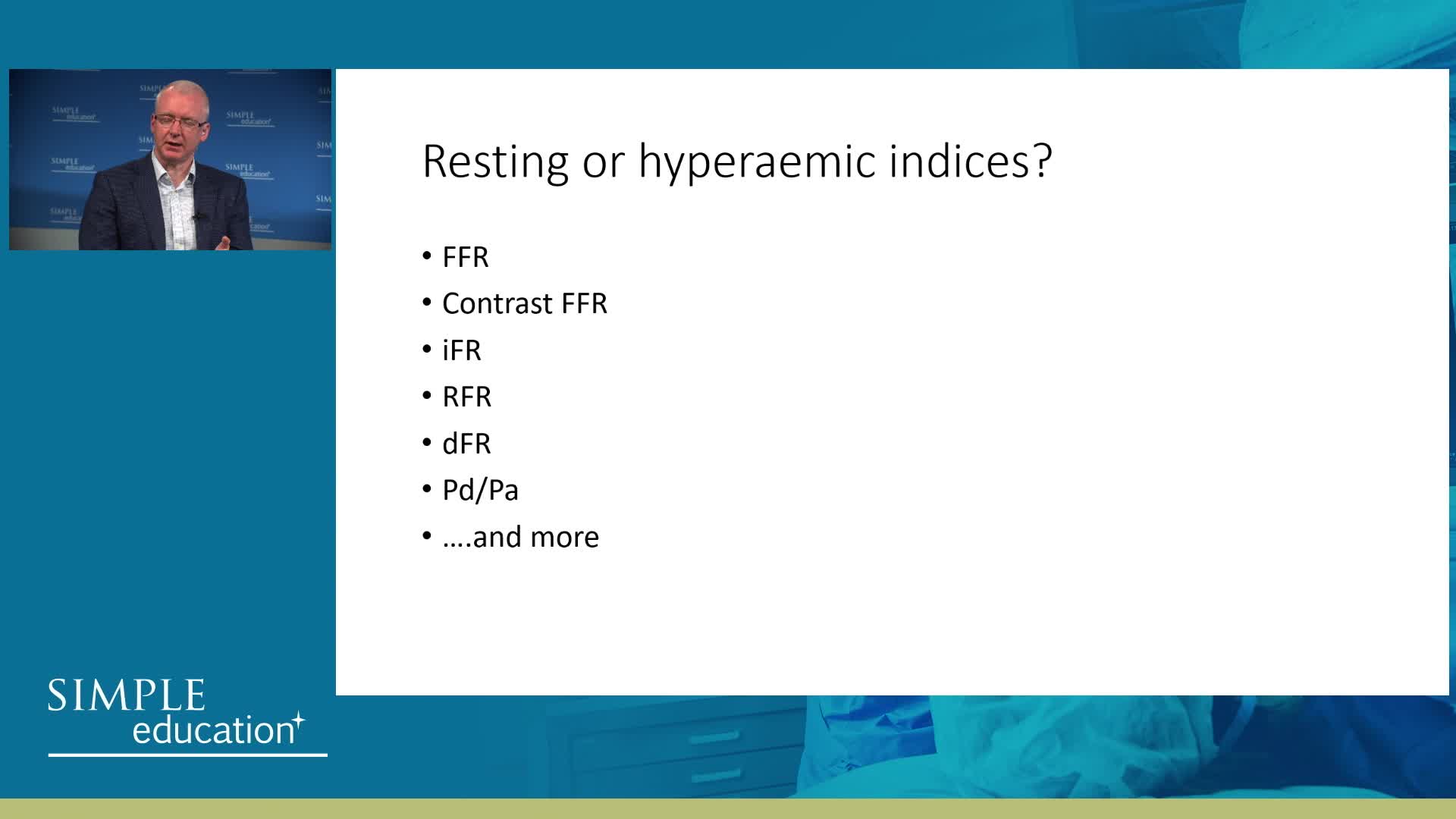Flow based indices of stenosis severity
Simple Education, is a leading provider of coronary physiology and intracoronary imaging courses to aid treatment of complex coronary artery disease.
Speakers
Dr Justin Davies is a honorary interventional cardiologist at Hammersmith Hospital, Imperial... Dr Justin Davies is a honorary interventional cardiologist at Hammersmith Hospital, Imperial College NHS Trust, London. After training at Imperial College, he won a prestigious BHF research fellowship to study arterial haemodynamics. Since then he has continued to work on the development of mathematical algorithms to aid understanding of large artery physiology and to develop new tools to assess arterial disease. The holder of several patents, he has published widely in the field of hypertension, coronary and large artery physiology and is the winner of many national and international awards. He has several international collaborations, and is the developer of iFR and the co-principal investigator of the ADVISE studies, the DEFINE-FLAIR, ORBITA and DEFINE-PCI studies. Justin also has an interest in renal denervation, and has lead the first-in-man studies to evaluate the safety of this technique to patients with chronic systolic heart failure (REACH studies).
Dr Ricardo Petraco is a NIHR Lecturer in interventional Cardiology at Imperial College London,... Dr Ricardo Petraco is a NIHR Lecturer in interventional Cardiology at Imperial College London, performing his clinical work at Hammersmith Hospital. He has been working with coronary physiology at Imperial since 2010 on the development of the novel instantaneous wave-Free Ratio (iFR). Dr Petraco’s work with iFR has led to the proposition of the Hybrid iFR-FFR approach and has established iFR’s close relationship with coronary flow reserve (CFR). His interests in computer programming has led to the development of a software for automated analysis of coronary haemodynamics signals which is been used by many leading centres in the world. He has also pioneered the algorithm for iFR calculation without the need for an ECG signal, an approach which is now implemented in clinical consoles. He has secured several research grants and published extensively in the field of coronary physiology. His current research interests are on the development of methodologies to assess stenosis severity in situations of haemodynamic instability and on the understanding of how medical therapies modulate coronary resistance and flow. Clinically, his interests also include the use of intravascular imaging modalities to optimise PCI and has been engaged in IVUS training for cathlab staff and cardiology trainees.
Dr. Bruce Samuels is an interventional cardiologist on staff at Cedars-Sinai Medical Center... Dr. Bruce Samuels is an interventional cardiologist on staff at Cedars-Sinai Medical Center (CSMC) in Los Angeles, California. Dr. Samuels completed his medical studies at Albert Einstein College of Medicine in New York before returning to Southern California to complete his residency and chief residency in Internal Medicine at Harbor-UCLA Medical Center. At CSMC, he trained in both general and interventional cardiology before joining the medical staff there. In addition to his clinical practice in coronary intervention, Dr. Samuels has actively participated in numerous interventional trials including IVUS guided therapy, coronary physiology and microvascular disease. He is also working closely with the Barbra Streisand Women’s Heart Center based at CSMC, working as an interventionalist in the active coronary reactivity research there. As co-chair of a 30-day readmissions task force, he has helped to shape policy for CSMC in its efforts to improve quality delivery of care. He has frequently been invited as faculty to many scientific meetings and is a sought after speaker for numerous peer educational platforms. Dr. Samuels is a fellow of the American College of Cardiology and is Board Certified in Internal Medicine, Cardiovascular Diseases, and Interventional Cardiology. He is married with three sons; his outside interests include contemporary art and long distance running.
Prof Andrew Sharp qualified from Edinburgh Medical School in 1998 and is Professor of Cardiology... Prof Andrew Sharp qualified from Edinburgh Medical School in 1998 and is Professor of Cardiology at the University Hospital of Wales and Cardiff University in the U.K. He conducted his early training at the Royal Infirmary of Edinburgh, before moving to London for his senior clinical training. He completed the prestigious Milan-Imperial Interventional Cardiology Fellowship programme, having spent a year in San Raffaele and Columbus Hospitals, Milan, Italy, under the tutelage of Professor Antonio Colombo. He also spent three years training in interventional cardiology at Imperial College Hospitals in London. Prof Sharp was awarded an MD postgraduate research degree from the University of Edinburgh for his work on the hypertensive heart and his research interests include intracoronary imaging and physiology. as well as the use of device-based treatments for hypertension and pulmonary embolism.












